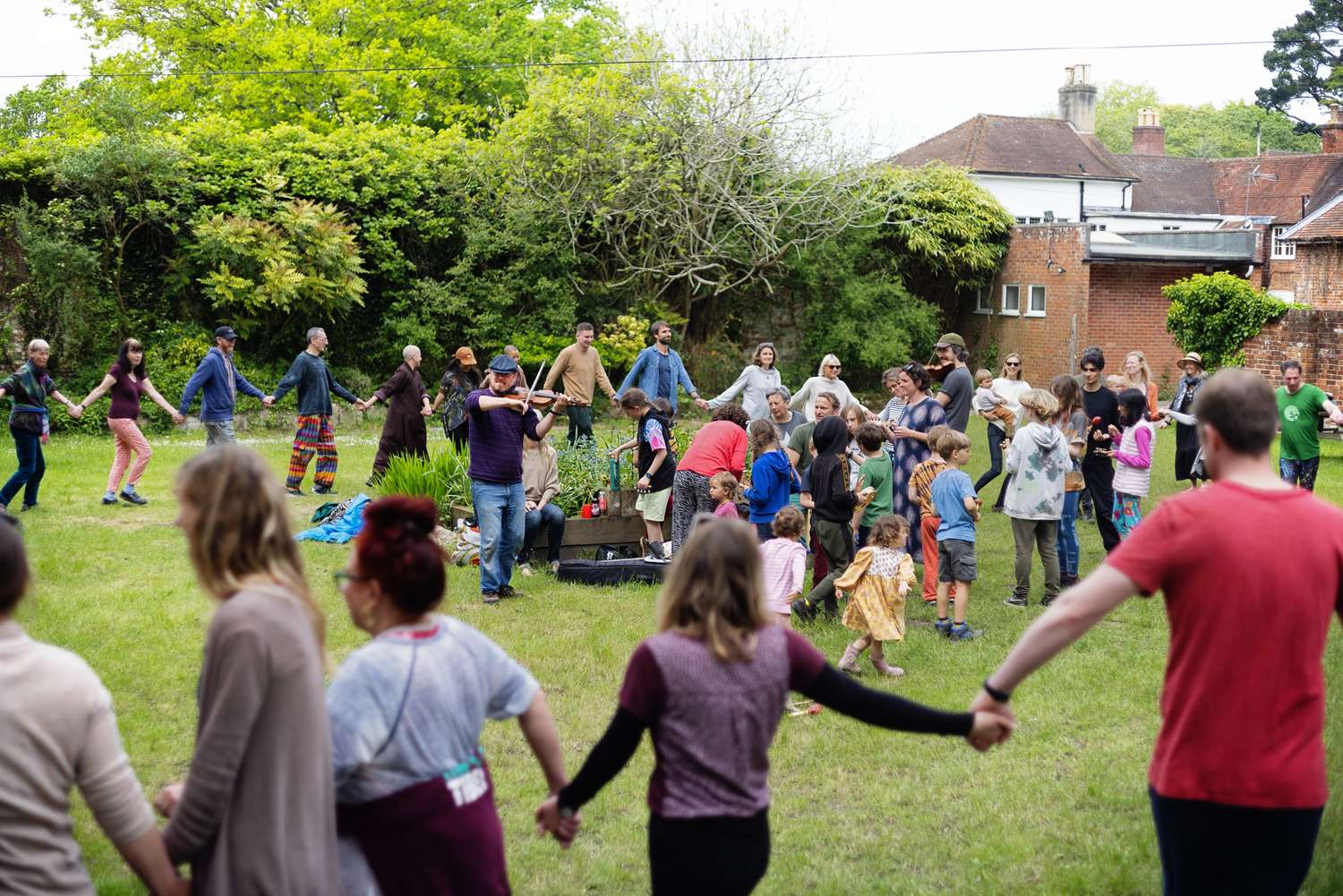
Brother Chân Trời Thiện Chí
On 5 May 2023, a group of four brothers and four sisters set off on a 5-week road tour throughout the UK (England, Scotland and Wales) and Ireland. Here are the reflections from a dear monastic member of the tour.
Where is my home?
How exciting to be on my first mindfulness tour as a monastic! Right at the start of the journey, I was reflecting in the van about where my home would be now. I felt that the answer was my heart. If I was connected to my heart, I could also connect to the hearts of my monastic brothers and sisters and to the hearts of the people we would meet along the way. If there is understanding and love, I feel that my home will be everywhere.
A mirror
I was happy to experience so much harmony and lightness in our mini sangha of eight. This harmony was sweet and precious. It gave me a feeling of relaxation and stability. I can see that this very harmony was the pillar of the tour and all of our offerings.
This tour was like a mirror in which I could see the state of my practice — how open, flexible and simple I was or was not. Could I flow with the group? What were my limits and difficulties? It was also an opportunity for me to learn new things and be courageous to offer in ways I had not done before.
Presence
In the teaching on the Seven Factors of Awakening, the Buddha advises us to cultivate joy and ease. On this tour, I understood how joy was an essential element for the well-being of our group. Laughter helped us to relax and open up; it enabled us to build friendship and trust. As a result, we were able to understand ourselves better and flow easier together.
I enjoyed the first Dharma talks in Chagford and Exeter, England, very much. Thay said, “The Sangha is my continuation,” and I only understood it intellectually. But now I could experience it clearly in the way we held the space, in the way the monastic siblings gave Dharma talks, in the way we introduced and adapted the practices to different places and people. I could also see Thay in the way the lay friends enjoyed being with us.
I loved it when we stopped at gas stations to have coffee together. Sr. One Way (Sr. Trang Mot Phuong) was our treasurer and we called her “Sr. Generosity” — just for fun. She bought us drinks and sweets, so every gas station was a mini celebration.
Sr. One Way also often offered us a special kind of Oolong tea. A really happy moment. We felt like kings when she poured us the fragrant tea. But I’m still not sure which is more fragrant — the tea or our togetherness?
Children in the mud
I remember Sr. Tam Moi saying once during our tour, “Do you notice that? It’s like spring lasts a long, long time. We’ve been on the road for several weeks and the trees are still in bloom. That’s because we’re traveling from the south to the north.”
Let me name just a fraction of the places we visited: ancient beech forests with carpets of bluebells; hills with big boulders on top; meadow of green grass and brown ferns where wild horses graze freely; sacred cathedrals with gardens of pink rhododendrons; national reserves; hidden stone beaches; small art bookstores; world-famous museums and streets; a university where the students showed us a meditation hall filled with poetry books and the on-campus redwood forest, and then invited us to participate in blessing the food before dinner.
We did walking meditation on a beach where seals played in the water; by streams with clear water; near Tibetan stupas on an island with wild horses; in university botanical gardens; in parks with rabbits in the heart of a city; in old cemeteries; by ponds; in forests with ancient trees and by puddles where small children played — completely covered in mud.
As monastics, we could go into the heart of a major cathedral in Durham, England, under the guidance of a Christian priest. We had the opportunity to offer events in churches, monasteries, universities and town halls, modern recording halls, chapels, tents, retreat centers and even in a round building made of mud and straw.
Preparing and letting go
When we were in Belfast, Ireland, Sr. Tai Nghiem invited me to talk at the end of a Dharma talk about how I practiced the art of stopping. I was nervous and tried to prepare myself well. Then my sister asked me to speak at the beginning of the talk, instead. A few hours later after all the preparations I did, she said to me, “Now brother, let go of everything you have prepared. The most important thing is that you connect with the people in the hall and speak to them. You don’t need to try to remember what you’ve prepared.” That was a hard lesson, but very important.
Eyebrows, tea and fame
My insights often come in unpleasant packages that I usually don’t want to open. Before the event in Belfast, I felt a lot of tension in my face. This tension was related to an upcoming event where I had to present something. I was worried and anxious, but luckily, I was able to find some time to sit just before the event. I started to relax my body and focused my attention on the unpleasant sensations in my face. As an aside, in my Shining LightTo learn more about the practice of Shining Light, see Thich Nhat Hanh, Stepping Into Freedom, Parallax Press., the brothers shared with me that I often frowned when I didn’t think anyone was watching. At that moment in Belfast, I asked myself, “What was behind this tension in my eyebrows?”
I could sense an uneasiness about my upcoming participation in the event. I felt like I already decided that I wasn’t going to like what I was going to share, no matter what the outcome might be or what my monastic siblings might tell me afterward. Slowly, I felt an icy cold feeling of hatred in me — hatred toward myself. A destructive energy that was generated by my mind directed toward myself. It was like a general ordering the troop to attack itself.
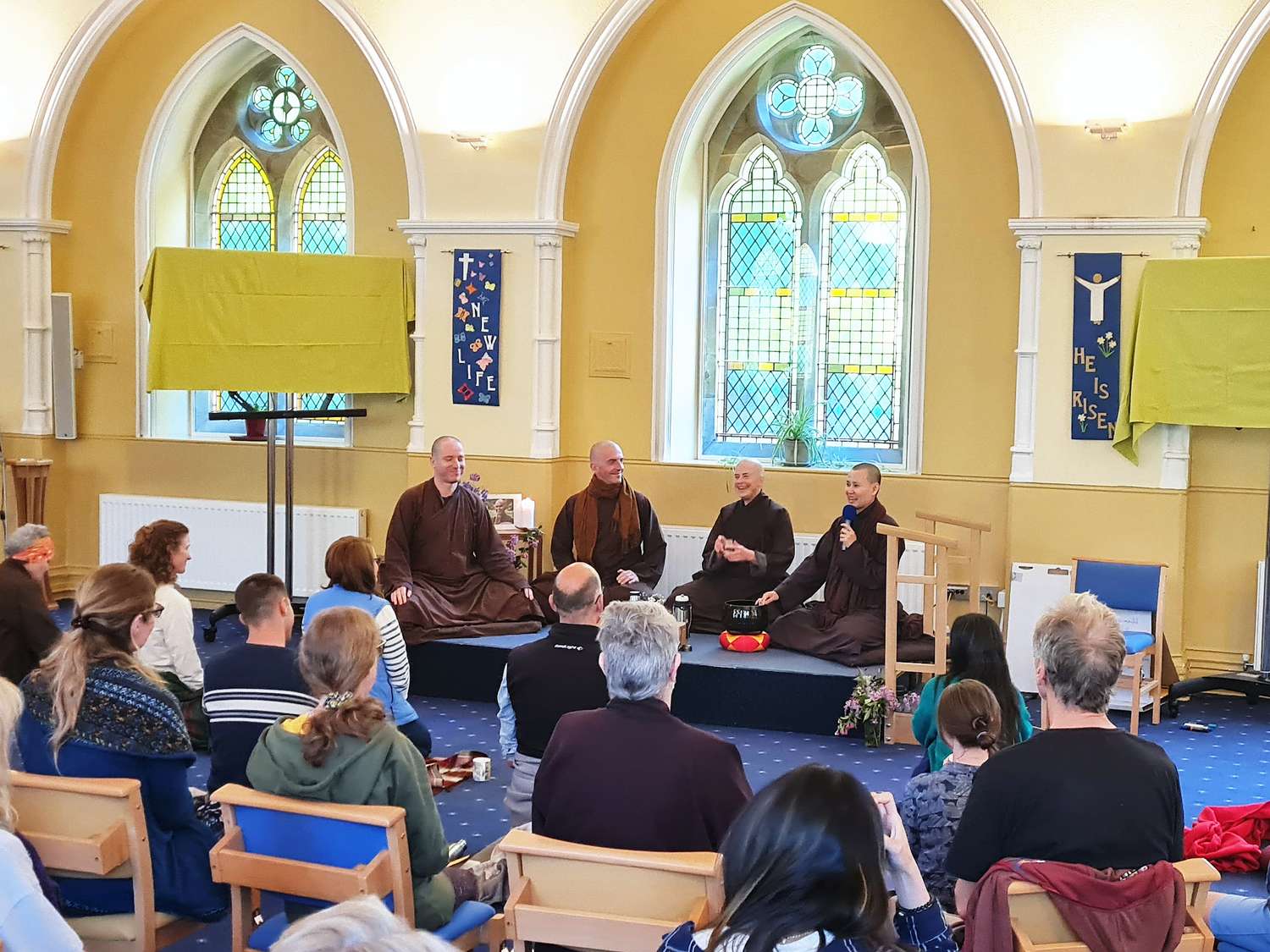
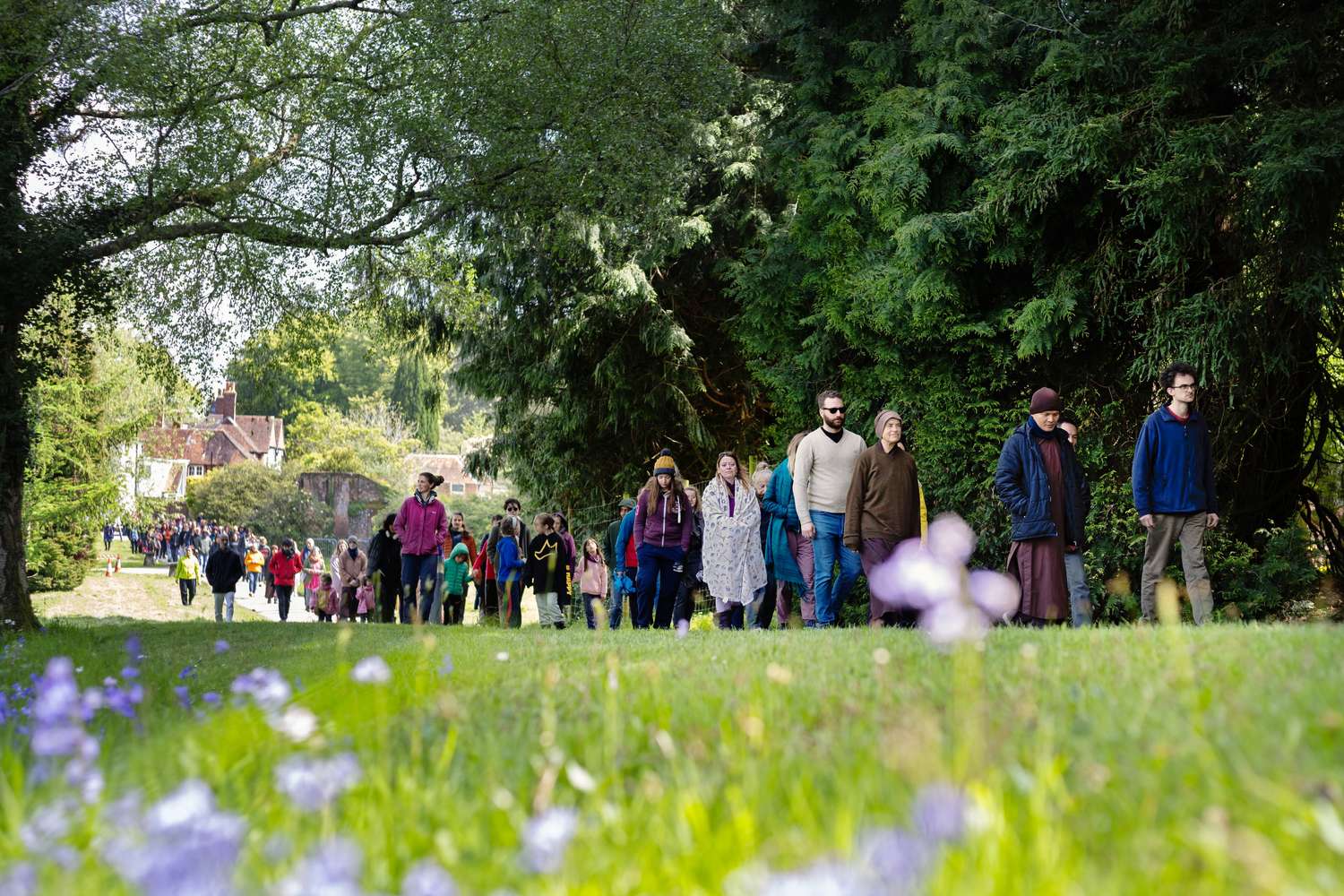

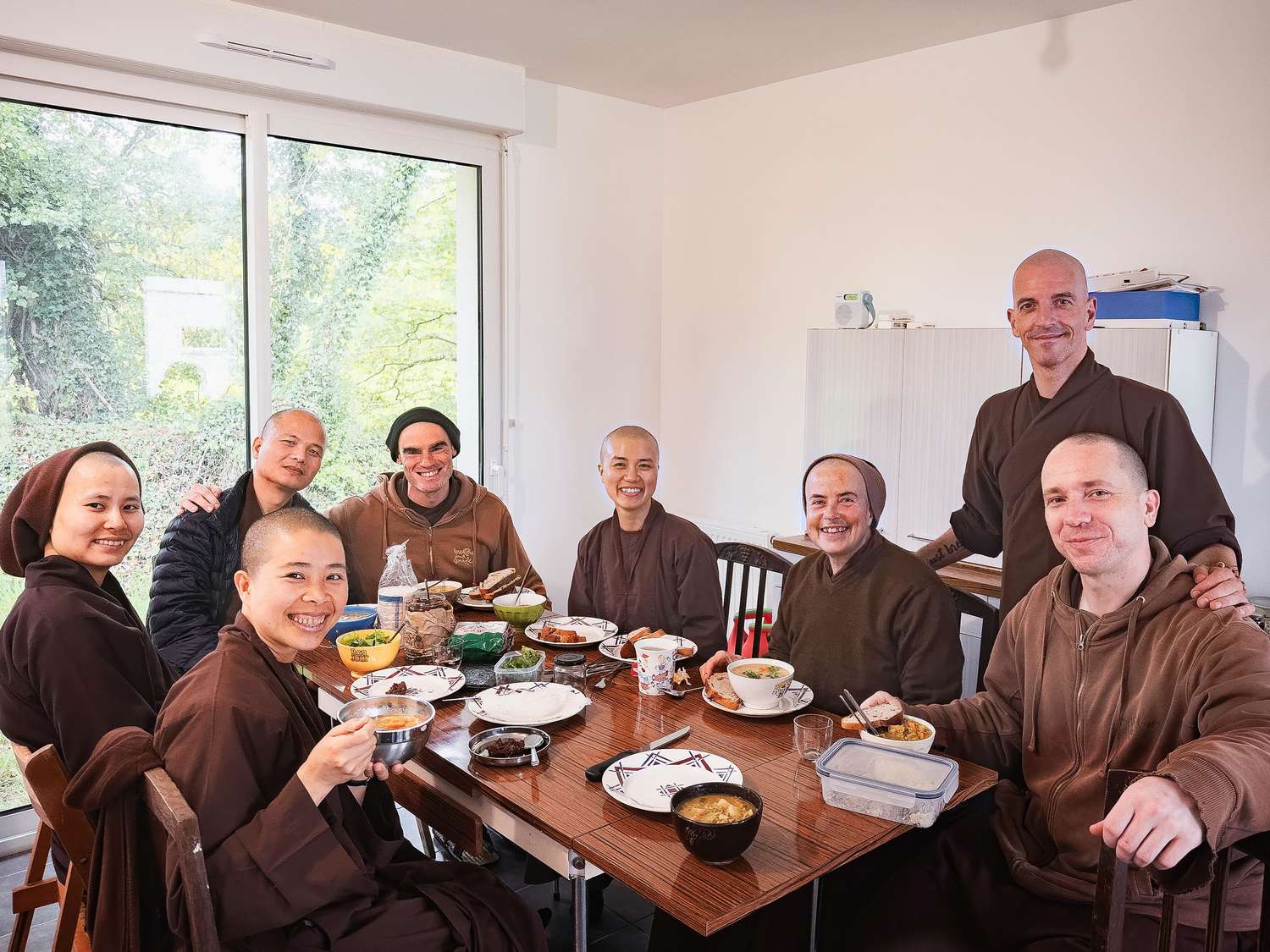
I had a similar experience in Cambridge, England. Whenever we distributed the tasks before the events, a part of me wanted to take on an “important” responsibility but another part wanted to be humble and moderate. I most often get a very unpleasant feeling after the tasks have been assigned. It took me several long early-morning tea-drinking sessions to recognize the unpleasant package of an insight. Oh, what a surprise — a search for fame, recognition and admiration. I was looking for love from the outside that I could not give myself; there was a need to be seen and appreciated by others. Of course, I didn’t want to have these needs, especially as a monk. I aspired to be humble and relaxed and practice equanimity.
How could I harmonize these opposing energies in me? Sometimes, it felt like a war from which there was no way out… except to simply accept the suffering. Relax in the suffering. Embrace and understand it. Let it manifest naturally in me but not identify with it.
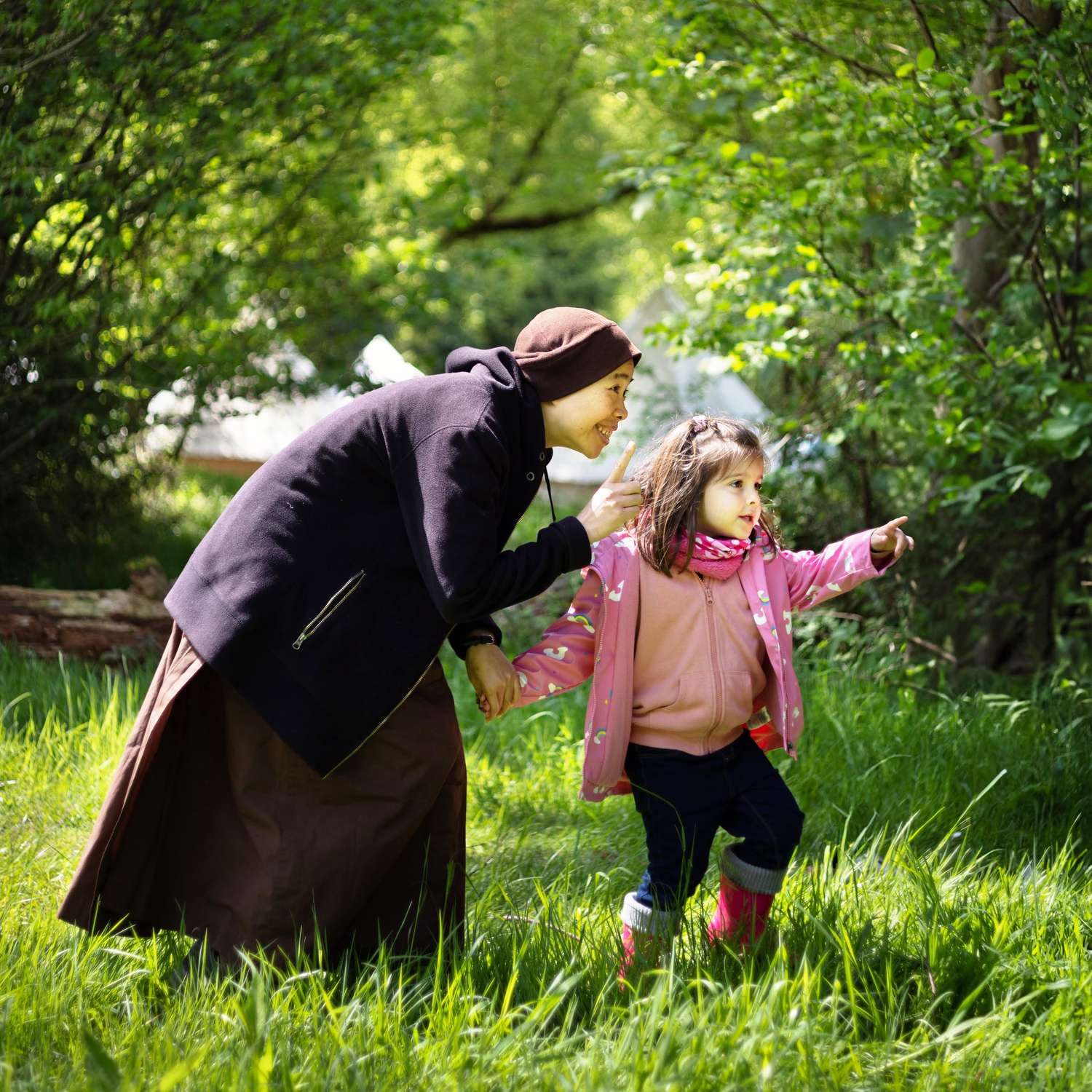
The painter of reality
My mind is a painter. When anger arises in me, the whole world becomes a place full of injustice. When sadness is there, I see only suffering and despair. When the sun of joy shines, the world is colorful and beautiful.
In Brighton, England, I noticed that I was starting to feel angry toward a brother. I could see the internal knot growing fast because we were together all the time. My ego was upset and was telling me stories about how rude and unfriendly his behavior was. Part of me wanted to listen and agree with it, but there was also a voice telling me, “You’re upset. Do Beginning AnewTo learn more about the practice of Beginning Anew, see Sister Chan Khong, Beginning Anew, Parallax Press. to calm down.”
Throughout the tour, we were together all the time. We planned and led events together, ate together, rested and traveled in the same van for five straight weeks! So it would not work for me to take time to reflect on what exactly was happening between me and my brother and contemplate about where it was potentially my fault, etc. In order to continue living together and focus on our events, I had to do beginning anew with him. I followed my intuition, shared my appreciation for him, and expressed my feelings and wish for harmony.
Once in Ards Friary, Ireland, I was late for the chanting before the Dharma talk; so the monastics started without me. Oh, I felt so bad when I entered the hall and saw my brothers and sisters chanting. Feelings of guilt, of not being worthy, of being excluded and of being useless swept over me all at the same time like a flooding hurricane.
There were only four of us organizing a retreat for 60 people. I felt I had to speak to my brothers and sisters right after the Dharma talk, despite the presence of all those feelings still alive in me. I knew that if I didn’t speak out, I would isolate myself from the group and get very upset.
Ards Friary is a wonderful place, like a paradise. The ancient forest almost reaches the beach. The ocean, like a giant amoeba in a gray-blue dress with thousands of veils of foam, leaving majestically in the morning and returning in the evening.
On this retreat, I understood that sometimes I needed to protect my brothers and sisters from my strong emotions and wrong views. Maintaining harmony requires open communication, sincerity and flexibility. In my experience, the practice of mindfulness is the only way to recognize how the painter creates a masterpiece with the colors of his emotions.
What is happiness?
Since I was a novice, I have always tried to rediscover what happiness is. As a layman, I simply followed my desires believing that their fulfillment would make me happy. I used to desire being surrounded by and owning things I liked, being with people I loved, going to places I admired, etc. But as a monk, I can’t take refuge in that kind of happiness. A monastic practices to look beyond these desires and discover a deeper happiness. If I am not able to be with the things and people I love, then where should I search for happiness?
The UK and Ireland tour has helped me realize that love was something I used to associate with people, objects and places. In reality, love, like compassion, is something that my mind and body generate. As a monk, I aspire to keep practicing to get in touch with these qualities within me and to train my mind to see them around me. Thay said that “understanding is love’s other name.” So, I continue to practice listening more deeply to myself.
If I nourish the seeds of love and compassion in me, then I will continue to see the world as a beautiful place and be able to connect with others, as well as help them recognize their seeds of love and compassion. The stronger these seeds grow within, the easier it will be for me to recognize them in my surroundings.
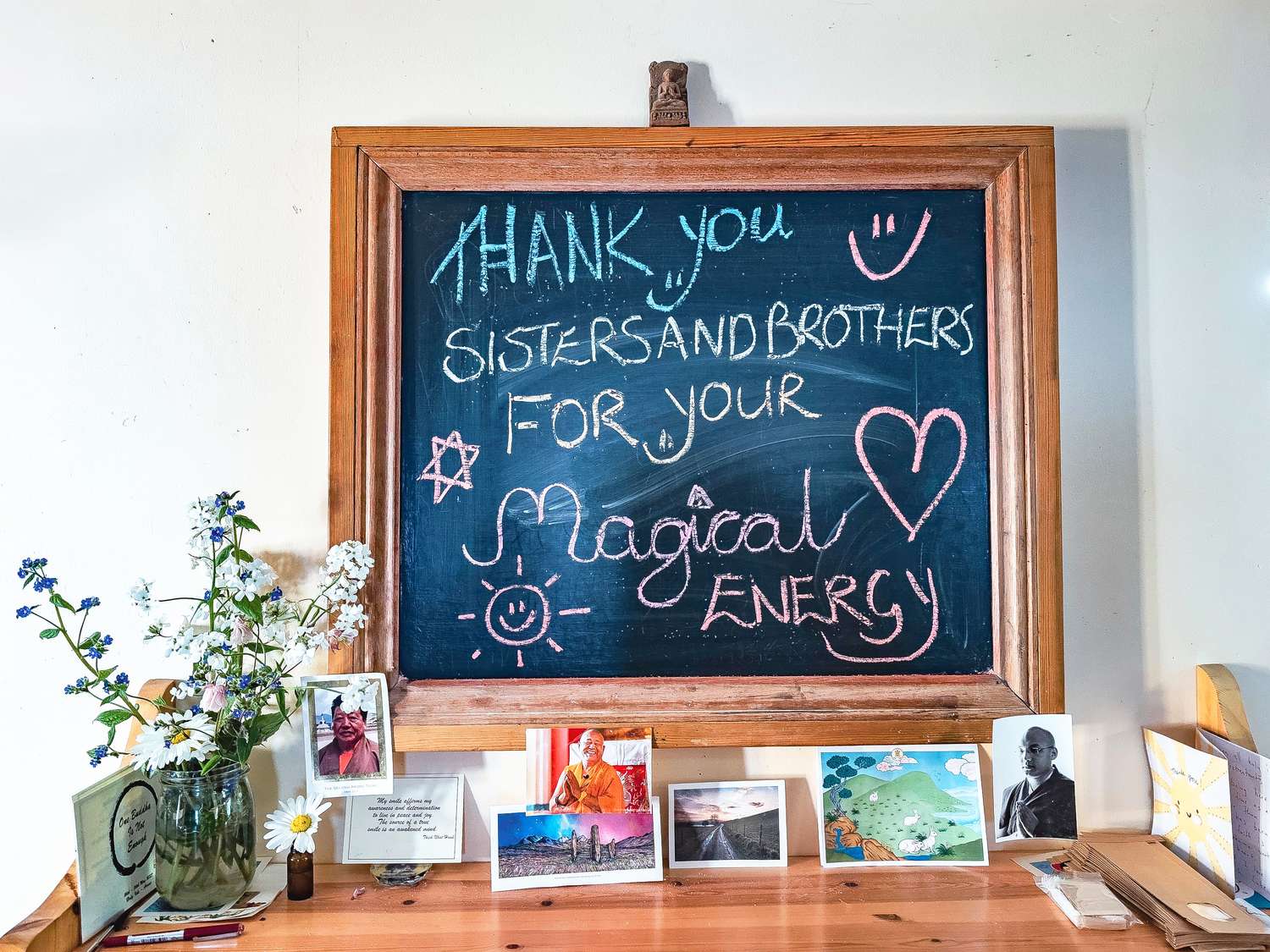
My greatest happiness during the tour was interacting with people. Learning about their way of life and hearing their stories, alongside breathing, laughing and crying with them. I learned and am still learning from them about how to be open, authentic, vulnerable and solid; how to let go, how to go through downfalls and depression, how to get up again and again, and how to love and live deeply. Being a monk offers me access to all these wonders of human experiences. I have had the privilege of connecting deeply with others on a spiritual level and collaborating with many to help build sanghas. In this way we can support and nourish each other, we can heal ourselves and help those around us to do the same.
